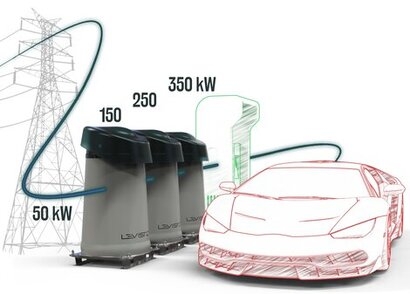
The grant will support Levistor’s commercialisation of its flywheel energy storage system (FESS), or ‘kinetic battery’, that can provide a short-term power boost to the grid wherever extra energy is needed to charge the next generation of ultra-fast-charge electric vehicles (EVs).
Levistor’s technology is designed to give an EV driver 100 miles range with just a 5 minute charge, and its commercial deployment in rural areas (as well as town and cities) will accelerate the roll-out of super-fast charging of EVs across the UK. Levistor claims its technology, which provides the grid with the extra power needed for on-street EV chargers, will put an end to range-anxiety among EV drivers.
The Levistor flywheel, developed by City, University of London, stores up energy from the grid at times of low demand and this energy is released at high speed to EVs when they arrive and are demanding a fast charge that requires a lot of power. It can be easily connected to the local grid and can be quickly deployed above or below ground singularly or in multiples. This makes the flywheel ideal for service stations, bus/rail termini, fleet depots and distribution centres (for example supermarket deliveries and general retail).
To date, the company has received grant support from Highways England, Innovate UK and the UK Department for Business, Energy & Industrial Strategy, and will soon be embarking on a crowdfunding campaign (via the Crowdcube platform), to accelerate its commercialisation.
“We are delighted to have secured a OZEV grant, as it’s really important, and indeed fair, that rural communities can take full advantage of EVs, without worrying about charging” said Matt Journee, Chief Executive of Levistor. “And it’s equally important that local electricity grids in rural areas can handle the increased demand that can be expected as the EV-driving revolution takes hold. Levistor’s proven technology provides a neat and cost-effective solution.”
For additional information:

